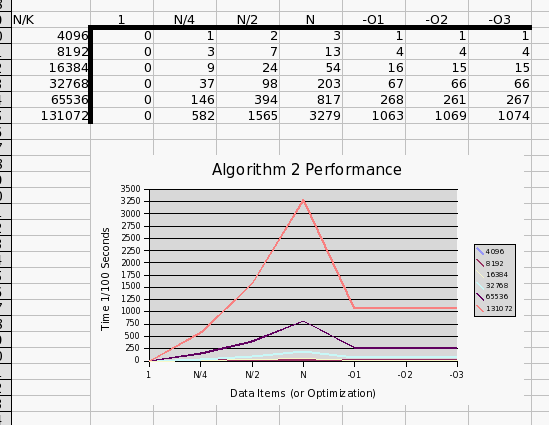- We would like to examine how different algorithms and data structures behave. Describe their performance characteristics.
- We are especially interested in what happens as the amount of data becomes large
- What do we mean by large?
- For the most part, problems you have solved in the past have involved small amounts of data.
- A few to a few hundred data items.
- In the real world, problems can become very large
- Process all of the customers in a database
- All of the citizens of a city/state/country
- The text for a novel.
- Is there anything we can do to mitigate the impact of the hardware on our study?
- We would like a little more permanence that just: How fast does it run today?
- You probably have seen something about this (O(n)) computations.
- But we will work on this much more as the semester goes along.
- A first Example: Given a list of n items, find the kth smallest.
- We must assume the items are not ordered.
- Algorithm 1:
FindItemK(A, n, k)
- sort(A,0,n-1)
- return A[k-1]
- This assumes that the sort sorts items 0-n and places the smallest item at position 0.
- In some sense this relates finding the kth smallest item to sorting.
- And the performance of the algorithm depends on the performance of sorting.
- Let us experiment a bit.
- We need to know about random numbers, srand, rand
- We need to know about times
- This is a system call that returns information about process time
- It is returned in a time structure
struct tms { clock_t tms_utime; /* user time */ clock_t tms_stime; /* system time */ clock_t tms_cutime; /* user time of children */ clock_t tms_cstime; /* system time of children */ }; - We need to include <sys/times.h>
- Each call will return time used so far in each area
-
times(&start); perform task times(&end);
- The code
- We should probably investigate two things:
- What happens when n changes?
- What happens when k changes?
- I ran the program on cslab177
-


- Algorithm 2:
FindItemK(A, n, k)
- sort(A,0,k-1);
- for i<- k to n-1 do
- if (A[k-1] > A[i] do
- place(ary, k, ary[i])
- return A[k-1]
- place is a routine that will insert an item into an
an array at it's proper position.
place(A, n, item)
- position <- n-1
- while position > 0 and A[position-1] > item do
- A[position] <- A[position-1]
- A[position] <- item
- Now we don't sort the entire list, so there is perhaps some work we don't do.
- Test Conditions were the same
-

- Notice for Algorithm 1, the results depended entirely on N
- In Algorithm 2, they also depended on K.
- How would we describe the behavior of these algorithms?
- Are they good enough?
- Can we do better?
- Can we predict the time required for a given size N and K?